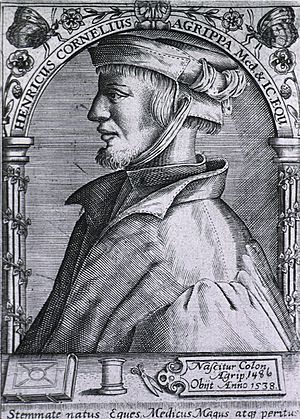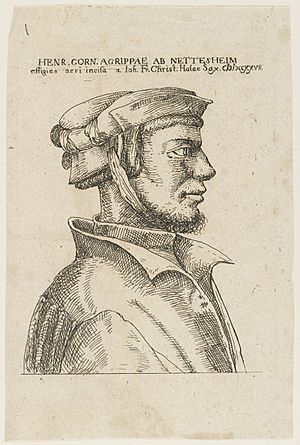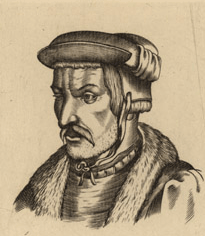Heinrich Cornelius Agrippa facts for kids
Quick facts for kids
Heinrich Cornelius Agrippa
|
|
|---|---|
 |
|
| Born | 14 September 1486 Nettersheim, Electorate of Cologne, Holy Roman Empire
|
| Died | 18 February 1535 (aged 48) |
| Alma mater | University of Cologne |
| Occupation | Occult writer, theologian, physician, legal expert, and soldier |
Heinrich Cornelius Agrippa von Nettesheim (born September 14, 1486 – died February 18, 1535) was a smart German man during the Renaissance period. He was a polymath, meaning he was good at many different things. He worked as a doctor, a lawyer, a soldier, a religious scholar, and a writer about occult topics.
Agrippa's most famous book was Three Books of Occult Philosophy, published in 1533. This book talked a lot about Kabbalah (a type of Jewish mysticism), Hermeticism (ancient spiritual beliefs), and neo-Platonism (a philosophy based on Plato's ideas). Many people interested in hidden knowledge in the early modern period were influenced by his book. However, some religious leaders in Cologne thought his ideas were heretical, meaning they went against official church teachings.
Early Life and Learning
Agrippa was born in Nettesheim, a town near Cologne, on September 14, 1486. His family was part of the middle nobility, and many of them had worked for the House of Habsburg, a powerful European family.
He started studying at the University of Cologne when he was about 13 years old, from 1499 to 1502. He earned a degree called magister artium. At the university, there were two main groups of thinkers: the Thomists and the Albertists. Agrippa likely became interested in the occult because of the Albertists. He even said that a book by Albertus Magnus called Speculum was one of his first books on occult studies. Later, he studied in Paris, where he might have joined a secret group interested in the occult.
Military Adventures
In 1508, Agrippa traveled to Spain to work as a mercenary, which is a soldier who fights for money. He continued his travels through many places like Valencia, Sardinia, and Naples. He served as a captain in the army of Maximilian I, who was the Holy Roman Emperor. Maximilian I even gave him the title of Ritter, or knight.
University and Work Life
Agrippa's career in universities began in 1509. He received support from important people like Margaret of Austria, who was a governor. He was given a chance to teach a course at the University of Dole about a book by a Hebrew scholar.
While at Dôle, Agrippa wrote a book called De nobilitate et praecellentia foeminae sexus. This book argued that women were superior, using ideas from Kabbalah. He probably wrote it to impress Margaret. His lectures were popular, and he even earned a doctorate in theology. However, a religious leader accused him of being a "Judaizing heretic," and Agrippa had to leave Dôle in 1510.
In the winter of 1509-1510, Agrippa went back to Germany. He studied with a famous scholar named Johannes Trithemius. On April 8, 1510, he showed Trithemius an early version of his book De occulta philosophia ("On the Occult Philosophy"). Trithemius advised him to keep his occult studies a secret.
Agrippa then went to the Netherlands and worked for Emperor Maximilian again. In 1510, the emperor sent him on a diplomatic trip to England. There, he stayed with John Colet, a dean at St Paul's Cathedral. Agrippa also wrote a response to the accusations made against him earlier. He argued that his Christian faith was fine with his interest in Jewish ideas. He wrote, "I am a Christian, but I do not dislike Jewish Rabbis." After that, Agrippa returned to Cologne and took part in debates at the university.
Agrippa followed Maximilian to Italy in 1511. He attended a church meeting in Pisa that was against Pope Julius II. He stayed in Italy for seven years, working for different rulers, teaching theology, and practicing medicine. During this time, he studied the works of famous philosophers and the kabbalah. In 1515, he gave lectures at the University of Pavia about a text called the Pimander. However, these lectures ended suddenly because of the victories of Francis I, King of France.
In 1518, Agrippa became a town lawyer and speaker in Metz. Just like in Dôle, his ideas soon caused problems with monks. He defended a woman who was accused of witchcraft, which led to a disagreement with the inquisitor, Nicholas Savin. Because of this, he left his job in 1520 and went back to Cologne for about two years.
He then worked as a doctor for a short time in Geneva and Freiburg. In 1524, he moved to Lyons to become the doctor for Louise of Savoy, who was the mother of King Francis I. In 1528, he left this job. Around this time, he was asked to give his opinion on whether King Henry VIII could legally divorce Catherine of Aragon. But he chose an offer from Margaret, Duchess of Savoy, and became an archivist and historian for Emperor Charles V.
Margaret's death in 1530 made his position weaker. Also, when some of his writings were published around the same time, his enemies became angry again. After being briefly jailed for debt in Brussels, he lived in Cologne and Bonn. He was protected by Hermann of Wied, who was the archbishop of Cologne.
By publishing his books, he came into conflict with the Inquisition, a church court that tried to stop the printing of De occulta philosophia. He then went to France, where he was arrested by order of King Francis I for saying bad things about the queen mother. But he was soon released. He died on February 18, 1535, in Grenoble. He was married three times and had a large family.
During his life, Agrippa worked as a religious scholar, doctor, lawyer, and soldier in Germany, France, and Italy. He spent a lot of his time studying hidden sciences and difficult religious and legal questions. These studies often led to him being accused of heresy. However, there is no strong proof that Agrippa was ever seriously punished for his interest in magic or occult arts. He was known for arguing against the persecution of witches.
Later in his life, Agrippa changed his mind about some of his earlier ideas about magic. He wrote that he had spent "much time and costs in these vanities" when he was young. He warned others against using magic for evil purposes, saying that those who use "deceits of devils" will face "torments of eternal fire."
According to his student Johann Weyer, Agrippa died in Grenoble in 1535.
Famous Books
Agrippa is perhaps best known for the books he wrote.
- De incertitudine et vanitate scientiarum atque artium declamatio invectiva (A Speech Attacking the Uncertainty and Vanity of the Sciences and the Arts, 1526): This book questioned how certain we can be about science and art. It influenced later thinkers like Montaigne and Descartes.
- Declamatio de nobilitate et praecellentia foeminei sexus (A Speech on the Nobility and Preeminence of the Female Sex, 1529): This book argued that women were superior in theology and morals.
- De occulta philosophia libri tres (Three Books Concerning Occult Philosophy, Book 1 printed 1531; Books 2–3 in 1533): This was Agrippa's most important work. It brought together many ideas about hidden knowledge and magic. Agrippa suggested that the natural world, the heavens, and the divine were connected through a special kind of magic. He believed this magic could help solve problems and strengthen Christian faith. This book greatly influenced later magical thinkers like Giordano Bruno and John Dee.
- A fake book called Fourth book of occult philosophy was sometimes said to be written by him, but it is not believed to be his work.
See also
 In Spanish: Enrique Cornelio Agripa de Nettesheim para niños Celestial Alphabet Renaissance magic
In Spanish: Enrique Cornelio Agripa de Nettesheim para niños Celestial Alphabet Renaissance magic
 | Misty Copeland |
 | Raven Wilkinson |
 | Debra Austin |
 | Aesha Ash |



